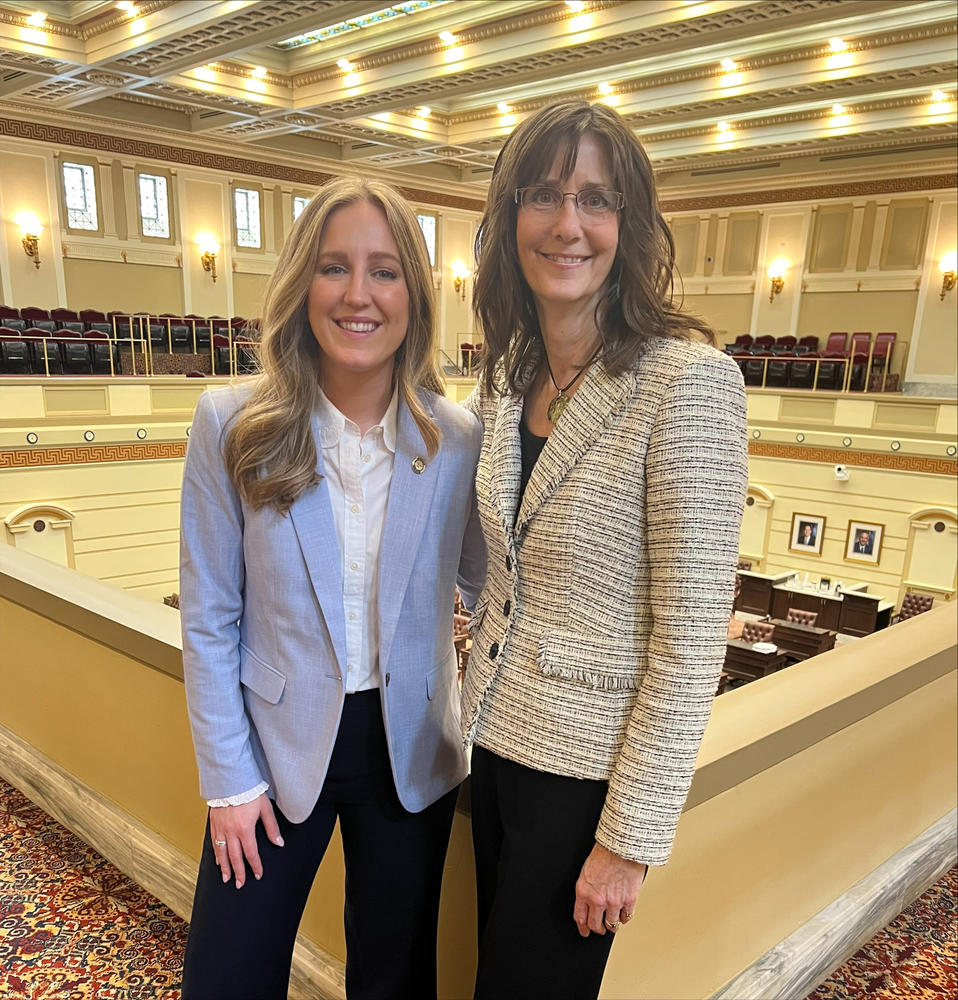In order to provide equal access and equal opportunity to people with diverse abilities, this site has been designed with accessibility in mind. Click here to view
Governor signs bill providing higher education scholarships to students with intellectual and developmental disabilities
 Sen. Ally Seifried, R-Claremore, joins Julie Lackey, of Owasso, who serves as Director of the Oklahoma Inclusive Post Secondary Education Alliance.
Sen. Ally Seifried, R-Claremore, joins Julie Lackey, of Owasso, who serves as Director of the Oklahoma Inclusive Post Secondary Education Alliance.
OKLAHOMA CITY – Gov. Stitt signed House Bill 3792 into law Tuesday. The legislation, authored by Sen. Ally Seifried, R-Claremore, establishes the Oklahoma Access and Achievement Program, aimed at providing scholarships to eligible students with intellectual and developmental disabilities pursuing higher education through comprehensive transition and postsecondary (CTP) programs.
“Every student deserves the opportunity to pursue their dreams and achieve their fullest potential,” Seifried said. “The Oklahoma Access and Achievement Program will open doors for students with intellectual disabilities, ensuring they have the financial support and resources necessary to succeed in higher education and become valuable members of Oklahoma’s workforce.”
A student enrolled at a university with a CTP program will typically take traditional classes with appropriate supports, in addition to specialized classes. Students will have trained peer mentors and participate in campus activities of their choice, including internships. Upon completion of the program, these students receive social, career, and academic skills that will help lead them to life success after college.
Julie Lackey, of Owasso, serves as Director of the Oklahoma Inclusive Post Secondary Education Alliance and worked closely with Seifried on this legislation.
“Governor Stitt’s signing of HB 3792 is a wonderful step to make higher education more affordable for students with intellectual disabilities who want to go to college. Looking back to 2016 when we began legislative discussions, the recent signing of SB 1624, and now HB 3792, it is amazing how far we have come. We are blessed to have worked with exceptional Senate and House legislators, those from the State Regents for Higher Education office, Oklahoma Rehabilitation Services, and many others to bring this dream to reality for Oklahoma students,” Lackey said.
In 2016, Oklahoma House Resolution 1065 was adopted, urging the collaboration of all parties to begin comprehensive transition and postsecondary education programs in our state for students with intellectual disabilities. Since then, Oklahoma has made significant strides. The state’s first program for students with intellectual disabilities began in 2018, and today, Oklahoma boasts three CTP-designated programs: the RiverHawk Scholars Program at Northeastern State University, Sooner Works at the University of Oklahoma, and Opportunity Orange Scholars at Oklahoma State University. These programs are part of a growing national movement, with over 300 inclusive post-secondary education programs listed on the Think College website.
Research shows that students who graduate from quality programs, such as those in Oklahoma, are more than twice as likely to be employed compared to their counterparts without post-secondary education, and they earn higher wages.
The scholarships will be funded through the Oklahoma Higher Access Learning Trust Fund, covering resident tuition costs for all eligible applicants.
“By providing these scholarships, we are not only investing in the education of our students but also in the future of our state,” Seifried continued. “I am proud to have worked with my colleagues on both sides of the aisle to pass this legislation, and thankful to Governor Stitt for signing this into law. I’d also like to say a special thanks to Julie Lackey, who I have worked with closely over the past two years to pass this legislation. She’s a true champion. I look forward to seeing the positive impact it will have on our students.”
The program will begin accepting applications for the upcoming academic year, with details available through the Oklahoma State Regents for Higher Education.
 Oklahoma Senate
Oklahoma Senate

